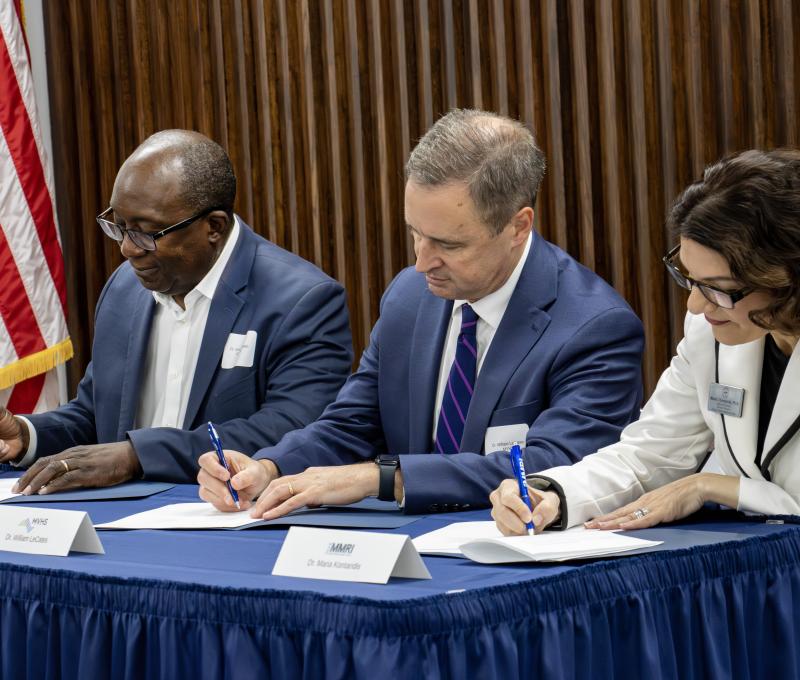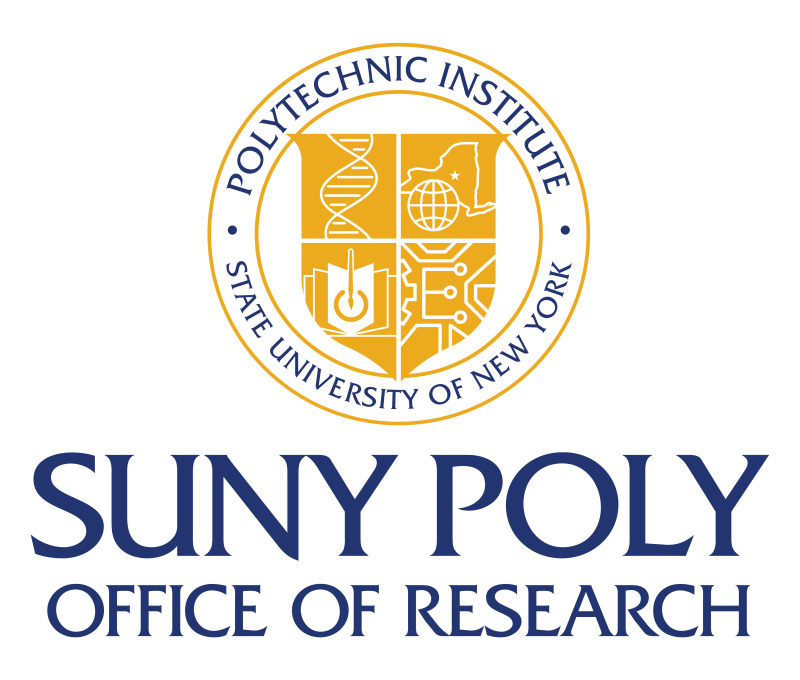News Release: SUNY Poly Professor Awarded $320,000 by National Science Foundation for Cutting-Edge Materials Research

For Release: Immediate – May 30, 2018
Contact: Steve Ference, Director of University Communications
(518) 956-7319 | sference@sunypoly.edu
Dr. Kathleen Dunn’s research uses SUNY Poly’s high-tech capabilities to better understand copper alloy behavior for more efficient additive manufacturing or longer lasting clean energy systems
ALBANY, NY – SUNY Polytechnic Institute (SUNY Poly) announced today that Dr. Kathleen Dunn, Associate Head and Associate Professor of the institution’s Nanoscience Constellation, has been selected to receive $320,000 in federal funding by the National Science Foundation’s (NSF) Metals and Metallic Nanostructure program under the Division of Materials Research. Dr. Dunn’s work will focus on exactly why adding certain metals to copper at the atomic level, such as tin or cobalt, changes copper’s characteristics, like its ability to conduct electricity, for example.
By utilizing a suite of SUNY Poly’s next-generation electron microscopy and spectroscopy tools, Dr. Dunn and a team of researchers, including SUNY Poly students, aim to use the foundational knowledge they gain to design better alloys that can lead to more cost-effective, less wasteful additive manufacturing and more robust clean energy system components.
“On behalf of SUNY Poly, I am proud to congratulate Dr. Dunn for receiving this NSF grant that will help enable the design of alloys from the atom up for the first time, something that is a true testament to the level of expertise of our institution’s faculty,” said SUNY Poly Interim President Dr. Bahgat Sammakia. “This pioneering research, based on years of collaboration with several industry partners, will utilize SUNY Poly’s state-of-the-art facilities, in addition to supporting educational opportunities for SUNY Poly students and providing younger children a chance to learn about nanoscience, all of which perfectly align with SUNY Poly’s academic and research mission.”
“I congratulate Dr. Dunn and her research team for receiving this NSF award which will help to increase our understanding of how the local atomic structure of copper alloys impacts the material’s properties, rather than simply relying on hundreds of years of observed macro-scale results,” said SUNY Poly Interim Dean of the College of Nanoscale Sciences Dr. Alain Diebold. “Significantly, this grant will also serve to inspire a number of students who will be able to directly contribute to this project and gain first-hand experience in this novel area of research.”
The NSF funding will support research that leverages advanced SUNY Poly tools, including the institution’s electron energy loss spectroscopy (EELS) capabilities. This is made possible by the FEI Titan3 Scanning Transmission Electron Microscope, which provides an unprecedented opportunity to interrogate individual atoms and the ways in which electrons are shared between them. Dr. Dunn and her team will be able to correlate changes in the electron band structure with the observed behavior and characteristics of the alloys at the macroscopic level to fine-tune its properties for specific applications. This could lead to a more targeted additive manufacturing process with decreased material waste and is also widely applicable to materials used in fuel cells and battery electrodes.
The research project, “2D Grain Boundary Phases: Establishing an Electronic Basis for Engineering Superior Copper Alloy Behavior,” builds upon years of innovation-centered materials research by Dr. Dunn with industry partners, including the Semiconductor Research Corporation, IBM via a faculty award, and Atotech USA. The goal of this work has been to address specific near-term questions of interest to the semiconductor industry, but these efforts now also showcase SUNY Poly’s unique ability to leverage industrially relevant projects into a foundation for more basic science research.
“I am thankful that the NSF has recognized the importance and potential of SUNY Poly’s materials research with this award. It will help us to develop a foundational strategy enabling the design of alloys which could have improved diffusion barrier performance, enhanced cohesiveness, or resistance to electromigration voiding to enable widespread use in the technologies we rely on each day around the globe,” said Dr. Dunn. “While I am very excited to have a chance to address a number of key questions and work with SUNY Poly students, I am thrilled that our unique research will also underpin exciting outreach activities for young children so they can realize that they too can play a leadership role in innovative scientific exploration, no matter what their background is.”
This three-year materials research project will support educational components for SUNY Poly students, as well as two educational outreach modules for use in outreach to K-12 teachers and students to interest younger students in the exciting potential of nanoscience. One graduate student will focus on fabricating the alloys, obtaining the microscope imaging, and collecting EELS spectra, information that provides a thorough, atomic-level understanding of a given material sample. This will also act as a capstone research project for SUNY Poly students and summer interns who will all be able to focus on data analysis and modeling using Density Functional Theory (DFT) to interpret the spectra.
More specifically, Dr. Dunn has focused primarily on how to manipulate the microstructure of materials to improve their performance, how the atoms arrange themselves during and after they are deposited, the fate of impurities that are incorporated into the copper, and whether stress can be used to manipulate the defect arrangements, which can impart certain desired behaviors. Other current awards, from globally recognized silicon wafer manufacturer SUMCO, support research looking at the microstructure of and defects in cobalt and copper-cobalt alloys, and the nanoparticles used for polishing wafers, the platform upon which computer chips are fabricated.
The NSF supports research, innovation, and discovery that provides the foundation for economic growth in the United States. By advancing the frontiers of science and engineering, the U.S. can develop the knowledge and cutting-edge technologies needed to address the challenges we face today and will face in the future.
####################
About SUNY Polytechnic Institute (SUNY Poly)
SUNY Poly is New York’s globally recognized, high-tech educational ecosystem. SUNY Poly offers undergraduate and graduate degrees in the emerging disciplines of nanoscience and nanoengineering, as well as cutting-edge nanobioscience and nanoeconomics programs at its Albany campus, and undergraduate and graduate degrees in technology, including engineering, cybersecurity, computer science, and the engineering technologies; professional studies, including business, communication, and nursing; and arts and sciences, including natural sciences, mathematics, humanities, and social sciences at its Utica/Rome campus; thriving athletic, recreational, and cultural programs, events, and activities complement the campus experience. As the world’s most advanced, university-driven research enterprise, SUNY Poly boasts billions of dollars in high-tech investments and hundreds of corporate partners since its inception. For information visit www.sunypoly.edu.








